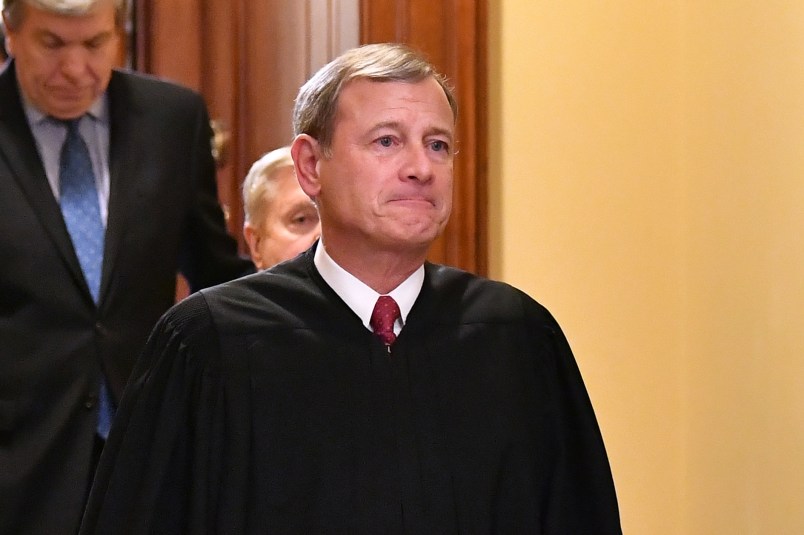The U.S. Supreme Court won’t rush to consider before the election the Pennsylvania Republican Party’s request that the justices reinstate an Election Day deadline for absentee ballots in the state to be received.
The fight over the deadline — which was extended by three days by the Pennsylvania Supreme Court — has been one of the biggest flash points in the legal wars over pandemic voting.
Wednesday’s order, which only indicated that the court won’t review the case before the election, by no means settles the dispute for good. In a statement accompanying the order, three conservative justices signaled their eagerness to rule in the Republicans’ favor, setting up the potential that thousands of Pennsylvania ballots could be rejected after the election.
This is the second time the Pennsylvania GOP has requested that the U.S. Supreme Court reverse the state court’s move. The U.S. Supreme Court deadlocked 4-4 on both the request the state GOP made earlier this fall and one from Pennsylvania’s Republican legislative leaders that the justices temporarily block the state Supreme Court decision.
The latest GOP bid for U.S. Supreme Court intervention seemed motivated by Justice Amy Coney Barrett’s recent addition to the court, which she joined only on Monday.
The Pennsylvania GOP had filed two requests shortly before her confirmation, but after their original emergency request fell short: that the U.S. Supreme Court take up the dispute on the merits and that it expedite the process for considering that review, so that the a decision would come down before the election.
The Wednesday order said that Barrett did not participate in the decision to deny the expedition request. It also said that additional opinions may follow.
It was accompanied, however, by a statement from Justice Samuel Alito, that was joined by Justices Neil Gorsuch and Clarence Thomas.
Alito’s statement said that there was “strong likelihood that the [PA] State Supreme Court decision violates the Federal Constitution,” while endorsing an extreme approach to election law that had been put forward by the Republicans in the case.
“The provisions of the Federal Constitution conferring on state legislatures, not state courts, the authority to make rules governing federal elections would be meaningless if a state court could override the rules adopted by the legislature simply by claiming that a state constitutional provision gave the courts the authority to make whatever rules it thought appropriate for the conduct of a fair election,” Alito wrote.
Though Kavanaugh did not sign on to Alito’s statement, he joined a Gorsuch concurrence making a similar point earlier this week, concerning a voting rules dispute out of Wisconsin.
Altogether, there appears to be at least four votes on the U.S. Supreme Court to significantly curb or end altogether the ability of state courts to interpret state laws and state constitutions as they apply to voting. In the event that the 2020 election is contested, a fifth in support of that approach could mean that state court rulings that favor Republicans’ opponents could be easily reversed by the U.S. Supreme Court.
Looking further down the road, such an approach would further embolden GOP legislatures to pass restrictive voting laws, as state courts would not serve as a check on such tactics.
According to a statement from the court’s public information office, Barrett did not participate in this particular order “because of the need for a prompt resolution of it and because she has not had time to fully review the parties’ filings.” The statement suggested that Barrett will not recuse herself from further court action in this dispute, despite Democrats’ calls that she recuse herself from election-related disputes given President Trump’s comments that he was putting her on the court to break ties in his favor.
Alito’s statement bashed the Supreme Court for not resolving definitively the dispute over Pennsylvania’s ballot deadline the first time it came up for the court’s consideration.
“The Court’s handling of the important constitutional issue raised by this matter has needlessly created conditions that could lead to serious post-election problems,” Alito said.
This second time around, Alito said, “there is simply not enough time
at this late date to decide the question before the election.”
“That does not mean, however, that the state court decision must escape our review,” Alito said, while noting the indication the court had already received from Pennsylvania officials that they will keep separate the ballots that arrive during the extended time period in question.
He said that segregating those ballots will make “targeted” relief possible if the U.S. Supreme Court ultimately reverses the state court’s decision, and he encouraged the Republican to reach out to the U.S. Supreme Court if they’re not “satisfied” with how the election officials are carrying out the separation of those ballots.







Pretty sure this was a case of ‘discretion being the better part of Valor’.
Or maybe they just decided to ‘lay low’ until the whole thing blows over.
“The Wednesday order said that Barrett did not participate in the decision to deny the expedition request.”
In the immortal words of Bob Uecker, “Juuust, a bit outside”
Here’s how I hope their thought process went: “We could help install Donald again. But how long would six of us be able to wear these robes after that before we are made art objects hanging by them on the Mall?”
As for Covid Barrett - maybe she has just a bit of sangfroid, if not sense.
What would be the point of taking it up after the election? I doubt the Roberts wants to after the fact tell a state to eliminate ballots already counted and certified. Seems a stretch to me.
The point is that the Dread Pirate Roberts does not want to get involved in an election.